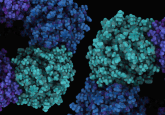Adapting aptamers: innovative sensor system allows direct detection from biological samples

Aptamers are nucleic acid-based biosensors capable of specifically binding to proteins or small molecules. They provide a means to detect target molecules without the need for complex analytical equipment. While their usage is increasingly employed in diagnostic applications across various diseases, the potential of aptamers as effective sensors for cancer is particularly notable due to the high cure rates associated with early cancer detection, exceeding 90%. Nevertheless, aptamers are still prone to degradation or aggregation by nucleases or charged proteins present in biological samples like blood or saliva. This limits their usage in clinical samples directly, without prior removal of these obstructing molecules.
To combat this, a research team led by professors Seung Soo Oh and Sungwook Woo from the Department of Materials Science and Engineering at POSTECH (Pohang, South Korea), has engineered a novel aptamer sensor system enabling the rapid detection of target molecules directly from biological samples, counteracting the need for any pre-treatment procedures. The team’s research article was published in the journal Biosensors and Bioelectronics.
In their study, the team manufactured spherical microcapsules called proteinosomes through the self-assembly process of protein-polymer amphiphiles. These microcapsules were tailored to encapsulate an aptasensor based on a structure-switching aptamer, which promptly reacts with a fluorescent signal upon interaction with the target molecules. The microcapsule surface is comprised of a size-selective and semi-permeable membrane, which allows only smaller target molecules to permeate whilst blocking larger, harmful proteins.
The experiment’s results showcased that optimal performance of the aptasensor in target detection remained intact even in untreated biofluids, which facilitated the rapid identification of various target molecules. These molecules included estradiol, a female hormone linked to reproductive organ cancer, dopamine, a neurotransmitter indicative of Parkinson’s or Alzheimer’s disease, and cocaine, a controlled substance that requires rapid on-site detection.
“By integrating sample separation and target detection, we have pioneered a novel small molecule point-of-care biosensor technology that is directly applicable to biological samples such as serum”, explained Professor Seung Soo Oh. “This platform has the potential to revolutionize medicine, spanning early disease detection and personalized treatment.”
You may also be interested in:
- Bioanalysis Zone – Finding a needle in a haystack: aptamer screening using hydrogels
- Multiplexed paper-based biosensor for point-of-care testing
- Fluorescent biosensor shines light on the activity of the rare-earth metal manganese
The microcapsules created by the researchers exhibited strong shielding against harmful unwanted proteins. The aptasensors enclosed within the microcapsule remained intact for up to 18 hours in highly concentrated nuclease solutions that exceeded the normal serum level by about 300,000 times. Expanding on the inherent characteristic of each capsule acting as an autonomous ‘reaction vessel’, the researchers demonstrated the autonomous operation of multiple aptasensors within the same mixture. This enabled concurrent real-time sensing of multiple target molecules, as well as tracking their respective concentration variations.
Source: Kim J, Yoo H, Woo S and Oh SS. Aptasensor-encapsulating semi-permeable proteinosomes for direct target detection in non-treated biofluids. Biosensors and Bioelectronics. 251, doi: 10.1016/j.bios.2024.116062 (2024).


